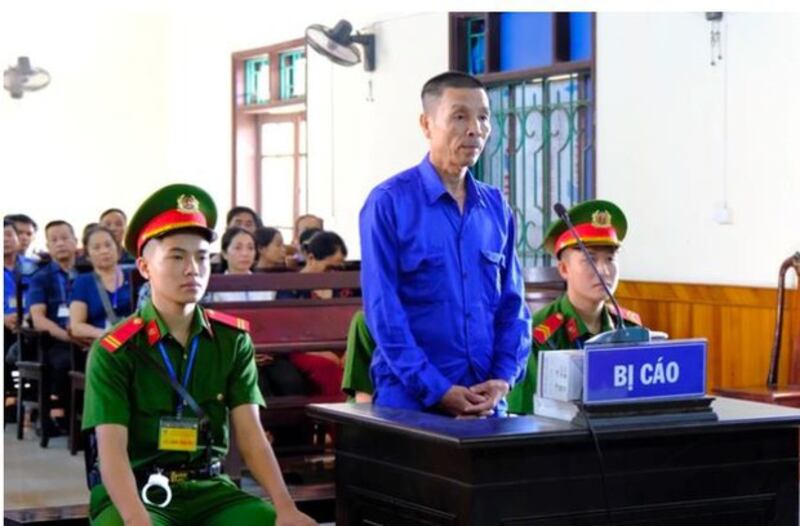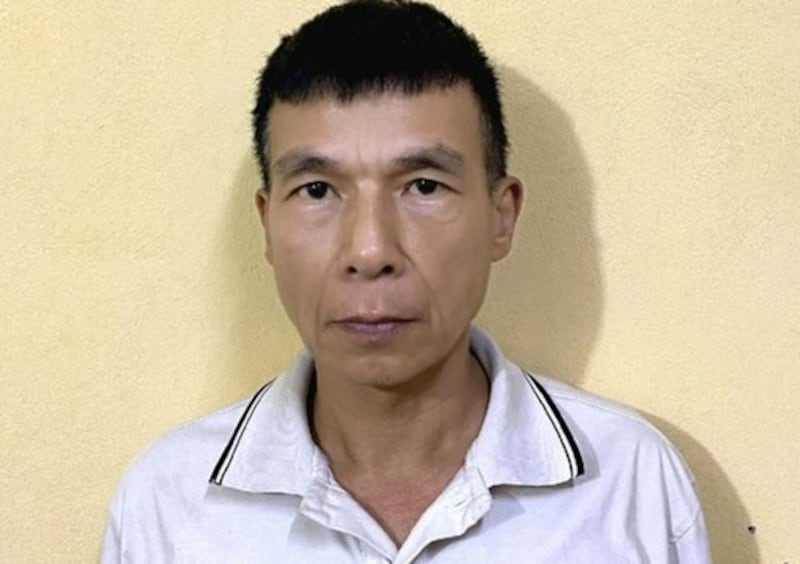Authorities in Vietnam are pressing on with a crackdown on social media users who are seen as critical of the government, using two articles of the Criminal Code that rights groups say are too vague, to punish those “opposing” the state and the ruling Communist Party.
After seven months in pre-trial detention, authorities in Hanoi have announced plans to prosecute Facebooker Phan Van Bach under Article 117 of the Criminal Code for "making, storing, spreading information, materials, items for the purpose of opposing the State of Socialist Republic of Vietnam.”
Bach, 49, has been an active campaigner for more a decade. He took part in protests against China's territorial claims in the South China Sea in 2011, the Green Trees environmental demonstrations in 2015, and the protests against pollution caused by Formosa Plastics in 2016.
According to an indictment issued on July 19 and recently shared by his family, Bach is accused of using his personal Facebook account to post 12 articles and six video clips between 2018 and 2022 with content said to "distort the Party's policies and guidelines, defame the Socialist Republic of Vietnam, deny the leadership role of the Communist Party of Vietnam, and disseminate edited images that defame state leaders and incite the masses."
Bach was detained on Dec. 29, 2023, but his wife Nguyen Thi Yeu wasn't allowed to see him until June 4.
“I didn't recognize him at all. He was no longer the same person as when he left,” she told Radio Free Asia. “He was thin and had scabies all over his body.”
Her husband told her he had diarrhea as soon as he was taken to the detention camp. When he asked to go to the hospital for treatment, he was given medicine, which made him constipated.
He was put in a 40 square meter (431 square foot) cell with more than 30 other inmates, where he developed scabies.
RFA called the investigator who handled Bach’s case several times but he did not answer the telephone.
‘Propaganda against the state’
In 2017, Bach joined independent YouTube channel CHTV, reporting on Vietnam's socio-economic issues.
Three members of the channel, Vu Quang Thuan, Le Van Dung and Le Trong Hung, are serving prison sentences ranging from five to eight years for the crime of “propaganda against the state.”
Bach often hosted live talks criticizing Vietnam’s one-party regime but in 2018 he announced he was leaving CHTV.
His Facebook page shows that in recent years he has only focused on his labor export business.

In another case in which Article 117 was used, the People’s Court of Ha Tinh province on Tuesday sentenced Phan Dinh Sang, 57, to six years in prison and two years probation, according to state-controlled media.
Prosecutors said that from 2016 to 2023, Sang created, managed, and used five Facebook accounts to participate in “reactionary” and “opposition” groups.
Vietnamese media said that, "during his time living and working in Laos, due to his dissatisfaction with the Vietnamese regime, the subject posted, distributed, and shared many articles, images, and videos with propaganda content, distorting history, and defaming the government."
Since the beginning of the year, Vietnam has detained at least eight people and sentenced at least six others to prison under Article 117, according to RFA statistics.
RELATED STORIES
[ Vietnamese activist found guilty of anti-state propagandaOpens in new window ]
[ Vietnam jails Facebook user for 7 years for ‘insulting Ho Chi Minh’Opens in new window ]
[ Vietnam arrests 2 Facebook users over ‘vaguely written’ Article 331Opens in new window ]
‘Abusing freedom’
International human groups have accused Vietnam of using the vague wording of Articles 117 and 331 of the Criminal Code to quash dissent.
"Both Article 117 and 331 violate Viet Nam's international human rights obligations and should be repealed or substantially amended to comply with the rules set out under Article 19 of the International Covenant on Civil and Political Rights (ICCPR), to which Vietnam is a state party, and other standards," international human rights group Amnesty International said in 2021.

In a trial on Aug. 21 and 22, a court in Tuyen Quang province used Article 331 to charge another social media poster, Le Phu Tuan, with "abusing freedom and democracy to infringe upon the interests of the state and the legitimate rights and interests of organizations and individuals," state-controlled media reported.
The 52-year-old was sentenced to four years and eight months in prison.
Prosecutors said that from September to December 2023 Tuan used his Facebook account to livestream and post 21 videos.
Details about the content of his posts were not immediately available but prosecutors said they were unverified, unofficial, and violated the interests of the state, the rights and legitimate interests of a number of local agencies and many individuals.
The indictment said the contents were shared many times and attracted numerous comments, souring public opinion, undermining trust in the state and lowering the prestige of government agencies.
According to RFA statistics, since the beginning of the year, at least 11 people have been arrested and eight have been convicted under Article 331.
Translated by RFA Vietnamese. Edited by Mike Firn.
